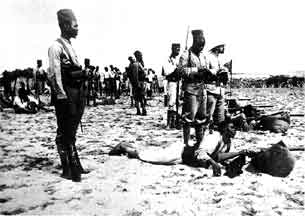French Warships Bombard Casablanca

In response to the killing of nine European workers in Casablanca, French warships bombarded the city on August 2nd. The French were soon forced to commit 15,000 troops to garrison Casablanca and insure the safety of French citizens. .
On August 2nd, the calm of Casablanca was disrupted when French warships launched a bombardment on the city. This military action was a direct response to the killing of nine European workers in the city. These workers, primarily of French origin, had met a tragic end, leading to a swift and decisive reaction from the French authorities.
Casablanca, a vital port city, has always been of significant importance in the region. Its strategic location and role in commerce made it an essential asset for the French colonial administration in North Africa. The death of the European workers in the city was perceived as a direct affront to French authority, and the response was deemed necessary to assert control and serve as a deterrent to further acts of aggression.
Following the bombardment, the French authorities deemed it crucial to further secure the city and ensure the safety of French citizens residing there. This led to the deployment of 15,000 troops to garrison Casablanca. The deployment of such a considerable number of troops underscored the importance of the city and the intent of the French to re-establish and maintain order.
The presence of this large garrison meant a heightened military presence in the day-to-day life of Casablanca. The city, known for its bustling markets, cultural sites, and historical significance, now had an unmistakable imprint of the French military. The troops were tasked with maintaining order, ensuring the safety of French citizens, and preventing any further incidents that could destabilize the region.
In the broader context, this event was indicative of the complexities of colonial rule. Maintaining control, ensuring the safety of colonial citizens, and navigating the intricacies of a foreign land were challenges that colonial powers like France often grappled with. The incident in Casablanca and the subsequent reactions highlighted these challenges in stark relief.
In summary, the events of August 2nd in Casablanca marked a significant episode in the history of French colonial rule in North Africa. The swift military response and the deployment of troops to the city were indicative of the measures colonial powers took to maintain control and order in their territories.
 >
>